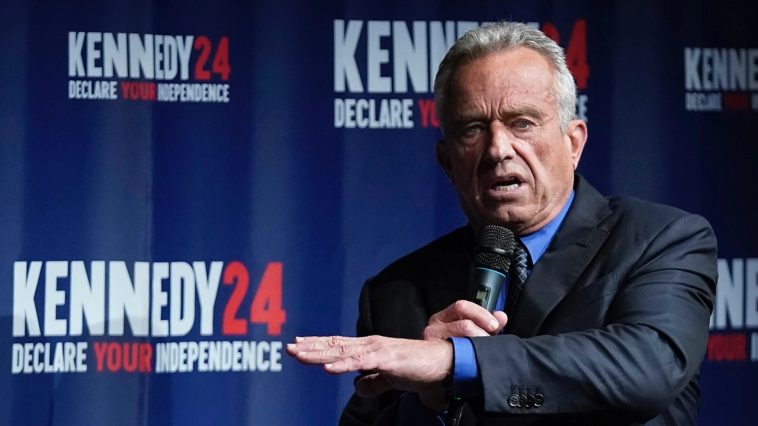In the 2016 race for the presidency, the Republican candidate Donald Trump achieved something that his party predecessors had not done in numerous campaigns: he managed to top the ‘blue wall’ of key states, securing his position in the Oval Office by defeating his Democratic competitor, Hillary Clinton.
Come 2020, the White House saw a shift as the then Democrat candidate Joe Biden managed to resurrect this blue wall with successes in crucial states like Wisconsin, Michigan, and Pennsylvania. It is worth noting, however, that these same regions today appear fraught with competition from Trump and a new Independent candidate – the ex-Democrat Robert F. Kennedy Jr.
A recent public opinion survey conducted by Quinnipiac University, as referenced by CNN, shed light that RFK Jr. commanded ‘a 22% favorability rating among registered voters.’ CNN’s political analyst, Harry Enten, highlighted this as a remarkable achievement, stating, ‘Kennedy is polling higher than any independent or third-party candidate in our generation.
His candidacy, among similarly non-major-party contenders, possesses a genuine possibility of influencing the 2024 election.’
Reflecting on the past, Enten added, ‘The most recent independent presidential contender to surpass 20% in a poll within a year of the election was Ross Perot in 1992 who ended up accumulating 19% of the popular vote.’ He further added that while the future for RFK Jr is uncertain, his current polling figures in the swing states are impossible to ignore.
Times/Siena College surveys show that the independent candidate’s popularity ranges from high teens to over 25% in the six closest states that Biden seized in 2020 from Trump: Georgia, Arizona, Wisconsin, Pennsylvania, Nevada, and Michigan. The outcome of these polls stirred up both parties—causing distress among the Democrats and excitement among Republicans. Moreover, Trump secured a higher proportion of the votes in five out of six of these states among registered voters and led in four when talking about likely voters.
Enten brought attention to the fact that the introduction of RFK Jr. into the likely voter mix resulted in trimming down Trump’s lead over Biden just to Georgia and Nevada. Simultaneously, his 5-point leads in states like Arizona and Pennsylvania dwindled to a tie. Biden, however, remained ahead in Pennsylvania, but this was still within the margin of error. He was on pair with Trump in Michigan.
To put it differently, what had initially appeared as a straightforward lead for Trump in polling data transformed into a convoluted array with no clear front-runner for securing an Electoral College victory, and RFK Jr. played a key role in this shift. Both Biden (34%) and Trump (36%) ended up with less than 40% in their total vote counts across the six aforementioned states, observed Enten.
Further elaboration by Enten suggests that it should not come as a surprise that an independent candidate could potentially absorb such a significant percentage of votes. The unfavorability ratings for both Biden and Trump were found to be in the high 50s in the Times/Siena poll, matching the numbers of the 2016 presidential race between Hillary Clinton and Trump, the least-liked candidates for their party nominations historically.
Earlier this month, a couple of political analysts presented insights that hinted at favorable conditions for Trump due to RFK Jr.’s potential influence in the forthcoming presidential competition. In a piece for The Daily Caller, Troy Olsen, a New York-based Army veteran and political author, and GOP strategist Gavin Wax, the executive director of the National Constitutional Law Union, put forward their disputes about the ‘buzz’ indicating that Robert F. Kennedy Jr.’s decision to break away from the Democrat Party to pursue an independent presidential campaign might prove to be detrimental to Trump’s bid.
Their hypothesis suggested that this move would more likely harm Biden by splitting the vote, rather than significantly undercutting Trump’s chances. While early polling data on this particular issue might not be plentiful, they found little to support the contrary and considerable evidence to bolster their own theory: an independent campaign by RFK Jr. is bound to leave his party’s incumbent president more vulnerable.
In their words, ‘President Joe Biden finds himself in a position of historical weakness, arguably the most vulnerable incumbent since President Carter, or maybe even earlier.’ Drawing from historical patterns, the duo behind the forthcoming book ‘The Emerging Populist Majority’ noted that when a third-party or independent candidate receives at least 5% of voters’ support, it usually works to the detriment of the sitting president, acting ‘much like a viable primary challenge within the president’s party.’
The political analysts further pointed out that votes secured by Gary Johnson—a former GOP governor—in 2016 along with those for the liberal Jill Stein turned in favor of Biden during 2020, suggesting the potential impact of these votes to have been decisive in 2016 as well.
In this ever-shifting political climate, independent or third-party candidates can play a crucial role in determining the final outcome. Their ability to draw votes away from incumbent party candidates could significantly tilt the scales in favor of the opposition. And in this scenario, RFK Jr.’s potential impact on the 2024 presidential race cannot be overlooked.
An independent run such as RFK Jr.’s can act as a wild card in the political equation, further upsetting the prospects of the two dominant political parties. While this might be a challenge for the major party candidates, it adds a new layer of intrigue and unpredictability to the presidential race and certainly enhances the democratic nature of the elections.
As we steer towards the 2024 election, this emerging situation reinforces that the political landscape is not a static entity; it’s always evolving. While the future remains uncertain, these findings certainly underscore that American elections can often be as complex and unpredictable as politics itself.



